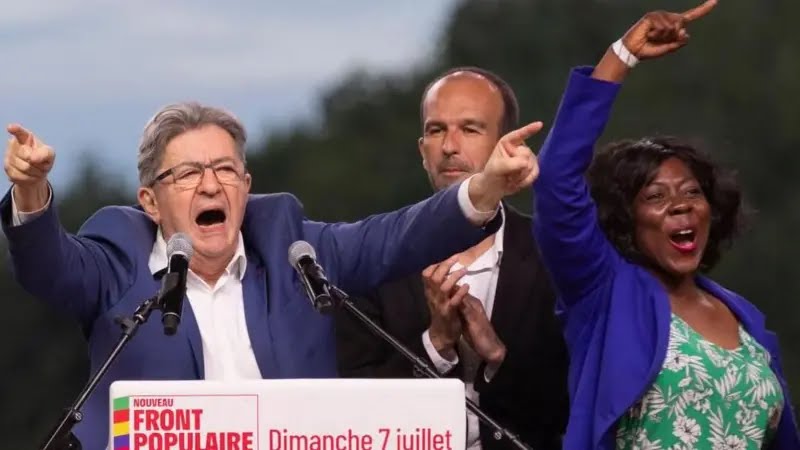Paris, France—The National Rally (RN) headquarters was set for a night of celebration. Party members and supporters gathered in anticipation, buoyed by Marine Le Pen’s confident predictions of a far-right triumph in the snap legislative elections. However, the mood quickly soured as initial results flashed on TV screens, revealing a surprising setback for Le Pen and her protégé, Jordan Bardella.
For weeks, the far-right seemed poised for a historic victory, driven by rising discontent over living costs, strained public services, and immigration. The RN had already dominated the first round of elections, leading many to believe an outright majority was within reach. Le Pen herself had forecasted Bardella as the next Prime Minister. Yet, the second round delivered an unexpected blow, with the National Rally projected to come in third behind a left-wing alliance and President Emmanuel Macron’s centrist bloc.
The RN’s downfall was significantly influenced by strategic alliances formed by centrist and leftist opponents. More than 200 candidates were pulled from three-way races to consolidate the anti-RN vote, a tactical move that paid off handsomely.
Jocelyn Cousin, an 18-year-old RN supporter, captured the prevailing disappointment at the party’s headquarters. “The results are disappointing, and they don’t represent what French people want,” Cousin lamented, reflecting the disbelief and frustration among the far-right’s young base.
Marine Le Pen had invested considerable effort in rebranding her party, distancing it from its xenophobic and antisemitic past to attract a broader electorate. This strategy had seemed to work, especially after the RN trounced centrists in the European elections in early June. However, the parliamentary setback raised questions about the party’s readiness to govern and the sincerity of its transformation.
Bardella attributed the defeat to what he called a “disgraceful alliance” of anti-RN forces, accusing them of misrepresenting the party and disrespecting its voters. However, analysts pointed to the RN’s own failings. IPSOS pollster Brice Teinturier highlighted internal issues, including revelations that several RN candidates held xenophobic views. These disclosures cast doubt on the party’s claims of having moved past its controversial roots.
Florent de Kersauson, an RN candidate from Brittany, acknowledged the damage caused by these revelations and suggested that the party’s overconfidence might have alienated voters. “I thought it was strange that they said that,” Kersauson remarked, reflecting on the party’s bold predictions of an absolute majority. “It seemed like something that was very hard to achieve.”
Despite the disappointment, Le Pen and Bardella attempted to maintain a positive outlook. They noted that the party had still managed to secure a record high number of seats in the National Assembly. “The tide is rising, but it didn’t rise quite high enough this time,” Le Pen stated, hinting at her likely candidacy in the 2027 presidential race. “Our victory has merely been delayed.”
This sentiment was shared by many at the RN headquarters. Elea da Cunha, a 17-year-old supporter, expressed unwavering optimism. “I see our victory coming. People are going to understand that the National Rally is not so horrible. I believe it will happen in 2027. I have a lot of hope and I’ll continue to fight,” she said.
Frederic-Pierre Vos, a close associate of Le Pen and a newly elected RN representative from a constituency north of Paris, suggested that the election’s hung parliament could lead to an ungovernable France, creating further opportunities for the RN in the future. “The political landscape is changing,” Vos noted. “We must remain vigilant and prepared for the next battle.”




